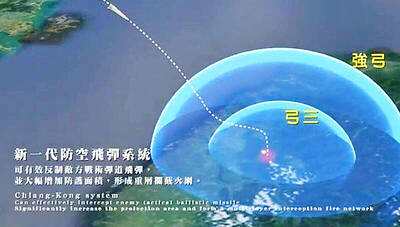China yesterday launched a new warning to other countries not to interfere in its affairs in Tibet and Taiwan.
Washington irked Beijing in January when it approved the sale of a US$6.4 billion package of arms to Taiwan, and then again a month later when US President Barack Obama met the Dalai Lama at the White House.
Without referring specifically to the US leader, Li Zhaoxing (李肇星), former foreign minister and spokesman for the National People’s Congress (NPC), said Western leaders should have better things to do than meet the Dalai Lama.
“Although Western leaders are very busy with their work ... they still take the time to see the Dalai Lama,” Li told a press conference.
“We can’t understand this, and when Chinese people hear about this they are very angry,” Li said. “Some people believe the sweet words of the Dalai, he says that he doesn’t support Tibet independence, but more importantly we watch his actions.”
He said it was “totally unacceptable” for foreign governments to interfere in China’s affairs by selling arms to Taiwan, adding: “At a time when the Chinese people across the Taiwan Strait are carrying out friendly exchanges as brothers, the advanced arms sales to Taiwan by a certain country is like handing a dagger to one person when he is hugging his brother.”
Meanwhile, Foreign Ministry spokesman Qin Gang (秦剛) said yesterday the US has pledged to work to improve relations with Beijing.
US Deputy Secretary of State James Steinberg held an “in-depth and candid exchange of views” with Foreign Minister Yang Jiechi (楊潔箎) and other officials during a three-day visit this week, Qin said.

LIMITS: While China increases military pressure on Taiwan and expands its use of cognitive warfare, it is unwilling to target tech supply chains, the report said US and Taiwan military officials have warned that the Chinese People’s Liberation Army (PLA) could implement a blockade within “a matter of hours” and need only “minimal conversion time” prior to an attack on Taiwan, a report released on Tuesday by the US Senate’s China Economic and Security Review Commission said. “While there is no indication that China is planning an imminent attack, the United States and its allies and partners can no longer assume that a Taiwan contingency is a distant possibility for which they would have ample time to prepare,” it said. The commission made the comments in its annual

DETERMINATION: Beijing’s actions toward Tokyo have drawn international attention, but would likely bolster regional coordination and defense networks, the report said Japanese Prime Minister Sanae Takaichi’s administration is likely to prioritize security reforms and deterrence in the face of recent “hybrid” threats from China, the National Security Bureau (NSB) said. The bureau made the assessment in a written report to the Legislative Yuan ahead of an oral report and questions-and-answers session at the legislature’s Foreign Affairs and National Defense Committee tomorrow. The key points of Japan’s security reforms would be to reinforce security cooperation with the US, including enhancing defense deployment in the first island chain, pushing forward the integrated command and operations of the Japan Self-Defense Forces and US Forces Japan, as

IN THE NATIONAL INTEREST: Deputy Minister of Foreign Affairs Francois Wu said the strengthening of military facilities would help to maintain security in the Taiwan Strait Japanese Minister of Defense Shinjiro Koizumi, visiting a military base close to Taiwan, said plans to deploy missiles to the post would move forward as tensions smolder between Tokyo and Beijing. “The deployment can help lower the chance of an armed attack on our country,” Koizumi told reporters on Sunday as he wrapped up his first trip to the base on the southern Japanese island of Yonaguni. “The view that it will heighten regional tensions is not accurate.” Former Japanese minister of defense Gen Nakatani in January said that Tokyo wanted to base Type 03 Chu-SAM missiles on Yonaguni, but little progress

INTERCEPTION: The 30km test ceiling shows that the CSIST is capable of producing missiles that could stop inbound missiles as they re-enter the atmosphere Recent missile tests by the Chungshan Institute of Science and Technology (CSIST) show that Taiwan’s missiles are capable of intercepting ballistic missiles as they re-enter the atmosphere and pose a significant deterrent to Chinese missile threats, former Hsiung Feng III missile development project chief engineer Chang Cheng (張誠) said yesterday. The military-affiliated institute has been conducting missile tests, believed to be related to Project Chiang Kung (強弓) at Pingtung County’s Jiupeng Military Base, with many tests deviating from past practices of setting restriction zones at “unlimited” and instead clearly stating a 30.48km range, Chang said. “Unlimited” restrictions zones for missile tests is